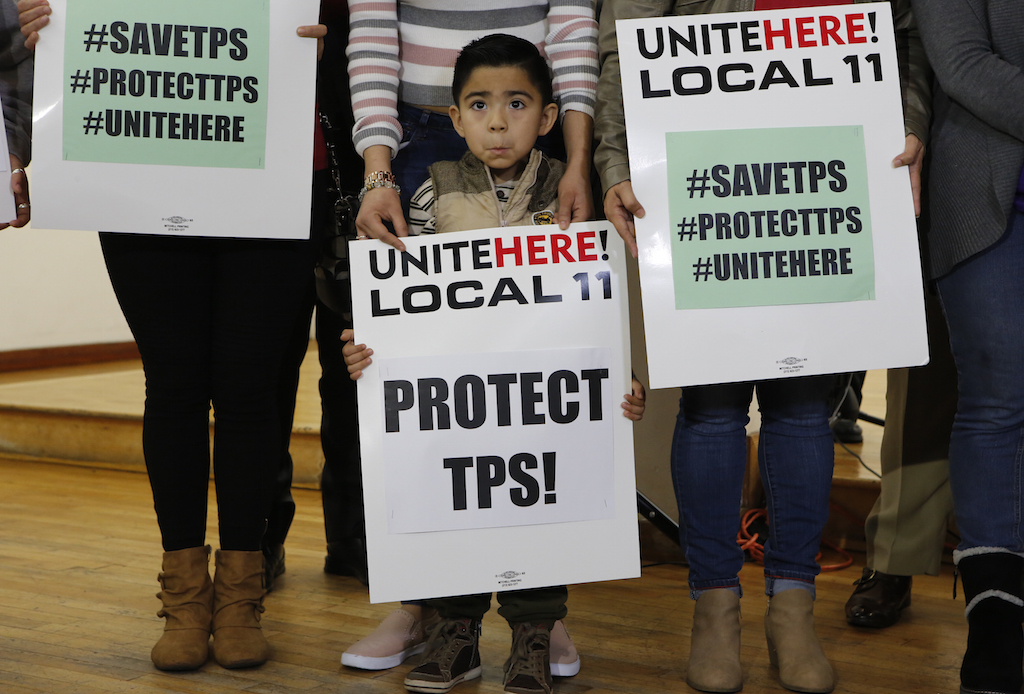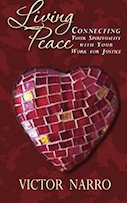Spirituality in the Trump Era?
Compassion and humility, mixed with toughness and resiliency, are excellent weapons for the fight against the president's anti-immigration crusade. Mateo Barrera, 4, originally from El Salvador, with family members at a January news conference in Los Angeles on temporary protected status. The Trump administration is ending special protections for Salvadoran immigrants, an action that could force nearly 200,000 to leave the U.S. (Damian Dovarganes / AP)
Mateo Barrera, 4, originally from El Salvador, with family members at a January news conference in Los Angeles on temporary protected status. The Trump administration is ending special protections for Salvadoran immigrants, an action that could force nearly 200,000 to leave the U.S. (Damian Dovarganes / AP)
Editor’s note: The story of America is the story of immigrants. But since Donald Trump became president, the immigration issue has become a humanitarian crisis in the United States. Truthdig political correspondent Bill Boyarsky investigates the impact of Trump’s anti-immigrant racism on Los Angeles—home to 1 million undocumented immigrants—in this ongoing series for Truthdig called “Demonizing the City of Angels.” You can read all of Boyarsky’s stories in the series here.
The Trump administration’s assault on immigrants is growing more fierce, both in Washington, D.C., and on the streets. Meanwhile, resistance to this aggressive policy, along with immigrants’ fear of deportation, becomes more intense. Into this maelstrom stepped Victor Narro and his book, “Living Peace, Connecting Your Spirituality With Your Work for Justice.”
Spirituality in the Trump era? With Attorney General Jeff Sessions and President Trump’s chief of staff, John Kelly (the former secretary of homeland security), calling the shots, federal agents—without a scintilla of humanity, much less spirituality—are intensifying their sweeps in search of undocumented immigrants. Separating families and ripping people from their schools, homes and jobs is the opposite of spirituality. And it’s hard to fight these powerful forces with the thin resources available to community immigrant rights organizations.
Narro is project director at the UCLA Labor Center. He also teaches at UCLA and UCLA law school. He is a sympathetic man with a soft but persuasive voice.
Over the years, Narro and his colleagues have organized exploited workers, most of them Latino immigrants who are janitorial, garment, carwash and food industry workers and others in industries famous for low pay and bad working conditions. In addition, they have advised and worked in immigrant rights organizations trying to protect women, men and children from the increasing number of arrest sweeps by Immigration and Customs Enforcement. This is difficult work emotionally, and it’s physically demanding, because ICE agents can and do pick up immigrants at any time. Narro wrote “Living Peace” as a guide, an inspiration and a reminder that rights organizations’ tough daily tasks have a higher purpose.
It’s a slender book, written in a down-to-earth style. Each chapter ends with questions designed to encourage readers to reflect on what they have read. Blank pages for notes follow. “You may want to convert this book into your spiritual notebook that you can refer to over and over again in your daily work as an activist,” he says.
Narro was inspired by the teaching of St. Francis of Assisi. He was also inspired by Thich Nhat Hahn, the Vietnamese Zen master. Narro’s wife, journalist Laureen Lazarovici Narro, introduced him to Master Hanh’s teaching.
He reminds his stressed-out readers to take care of themselves.
“What Francis taught us when he was living out his last days was that we must not sacrifice ourselves to the extent of jeopardizing our healthy bodies, healthy lives and healthy balance,” Narro writes. “Francis died at age 45, but his body was broken and in significant ill health when he was 10 years younger. I always imagine how much more he would have been able to do if he had taken care of his body and health. … Our ability to do our work for social justice is reliant on our physical capacity and our health.”
As I read the book, I thought about the many grass-roots community organizers I met while covering immigration, poverty or political crusades and how they could use such practical advice.
Narro also writes: “A friend and colleague in the movement once mentioned to me that Francis was the first person in history to ‘walk the talk’—in other words, practice what he preached.”
Concentration on action rather than the careerism that too often afflicts activists is important, Narro says.
“It requires a process of fighting off my temptations to please myself before others, to please my sense of ego and self-centeredness, and to please my sense of leaving behind a legacy,” Narro writes. “These temptations, which I think are dominant throughout the movement, sometimes result in me losing my sense of privileged status as an activist in my community.”
He cautions his readers to avoid expecting “praise or recognition to puff up our egos. We must be careful because our egos can be disguised as goodness or compassion. Our ego and selflessness can be so intertwined that we mistake them for one in the same. Humility prevents our healthy self-esteem from slipping into egotism and self-centeredness.”
When Narro gave me a copy of “Living Peace,” I was skeptical about a book on spirituality. I have spent most of my life in one of the world’s most unspiritual businesses, journalism. Dark humor and a habit of distancing ourselves from the sad or bad people we cover is a protective device, one that can morph into a cynical attitude toward everything.

Purchase in the Bazaar
Narro says: “Someone seems to be bad. What do we know about that person’s past experiences, parents, family upbringing, education, emotions … painful experiences, mental or physical sickness. …”
“Remember that the people you meet along the way in your journey are dealing with their own hopes and fears. Everyone you meet loves something, has lost something or fears something.”
Compassion and humility. Those qualities, mixed with toughness and resiliency, are excellent weapons for the fight against Trump’s anti-immigration crusade. They are also useful precepts for the journalists reporting on their fight.
Your support matters…Independent journalism is under threat and overshadowed by heavily funded mainstream media.
You can help level the playing field. Become a member.
Your tax-deductible contribution keeps us digging beneath the headlines to give you thought-provoking, investigative reporting and analysis that unearths what's really happening- without compromise.
Give today to support our courageous, independent journalists.







You need to be a supporter to comment.
There are currently no responses to this article.
Be the first to respond.